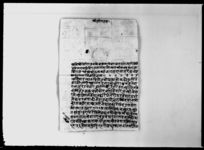A lālamohara from King Pṛthvīnārāyaṇa Śāha allowing the Newars of Patan the right to their property (VS 1826)
ID: E_3456_0009
Edited and
translated by Manik Bajracharya
in collaboration with
Rajan Khatiwoda
Created: 2016-06-27;
Last modified: 2018-06-22
For the metadata of the document, click here
The accompanying edition, translation/synopsis and/or commentary are available under the terms of the Creative Commons Attribution-ShareAlike 4.0 International License
Abstract
Receiving Rs. 1000 as salāmī and raitidaṇḍa from a family including Dhanju and others of Patan, King Pṛthvīnārāyaṇa Śāha allows them to enjoy their properties and to live as his subjects in the manner prescribed.Diplomatic edition
[1r]
1श्रीदुर्गासहाय़ \ [royal seal]1स्वस्तिश्रीगिरिराजचक्रचूडामनिनरनाराय़णेत्यादिविवि2धविरूदावलिविराजमानमानोन्नतश्रीमन्महांराजा
3धिराज•श्रीश्रीश्रीमत्पृथ्वीनारायणसाहदेवानाम्
4सदासमरविजयिनाम्•॥ ॥ ॥ ॥ ॥ ॥ ॥
5आगेपाटन्यानग्वैटोलकोङ्यांषाचोककोपुसिंने
6व़ारको•नातिआनंदनेव़ारकोछोरा•धन्जुनेव़ा
7र•भाजुदेउनेव़ार•ज्ञानसि[?]नेव़ारहरूआगिन्चो
8कसिर्तुङताकु•नुव़ाँकोटवसिवेपार•गर्न्या•नेव़ा
9रके•आजसंमनेपालकारैतिभैदोहतवेपारगर्दा
10नेकवदभय़ाकोनेपालकपिलाराषिइहांवस्या
11कोतक्सीरमाफ्गरिनेपालकारैतिदंडसमेत्
12सिक्काहज्जार•१०००सलामिलिकनआजउप्रां
13त•हांम्राकदमिरैतिसेव़कभयौआफ्नाघरषेतम
14हांवससोझोसेव़ागर•वंजवेपारगरसववातकोफा
15रषक्स्यौंआफ्नाषातिर्जामासितवसइतिसंम्वत्
16१८२६वैसाषसुदि•१४रोज६मुकामकाठमाडौशु
17भम्//
Translation
[1r]
May glorious Durgā help [us].
[Royal seal]
Hail! [A decree] of him who is shining with manifold rows of eulogy [such as] 'The venerable crest-jewel of the multitude of mountain kings’ and Naranārāyaṇa etc., high in honour, the venerable supreme king of great kings, the thrice venerable great king, Pṛthvīnārāyaṇa Śāha, the brave swordsman, the divine king always triumphant in war.
Āge: to the Nevāras Dhanju Nevāra, Bhājudeu Nevāra and Jñānasiddhi Nevāra—[who are] the grandsons of Pusiṃ Nevāra, [a resident] of Ṅyākhā Coka of Nagbai Ṭola1 in Patan, [and] the sons of Ānanda Nevāra—[and] who are engaged in trade, being settled in Āgin Coka2 , Sirtuṅa3 , Tāku and Nuvā̃koṭa.
We have pardoned the fault (taksīra) of dishonesty (nekavada) that has been committed in virtue of the fact that until today you, subjects (raiti) of Nepāla, have engaged in dual trade (dohaṭa bepāra)4 , staying here (i.e., in the places mentioned outside of the valley) while leaving your family (kabilā) in Nepāla. For this [pardon] we have received, together with the fine [imposed on such] subjects of Nepāla (nepālakā raiti daṇḍa), a levy (salāmī) of 1,000 coins (sikkā), so that from now on you are our subjects and servants5 . Live in your own houses and [on your own] lands. Serve [us] with honesty and engage in your trades. We have discharged you from all [liability]. Live dutifully.
Friday, the 14th of the bright fortnight of Vaiśākha in the [Vikrama] era year 1826 (1769 CE). Residence: Kathmandu. Auspiciousness.
Commentary
The last two letters of the document are written in the left margin.

